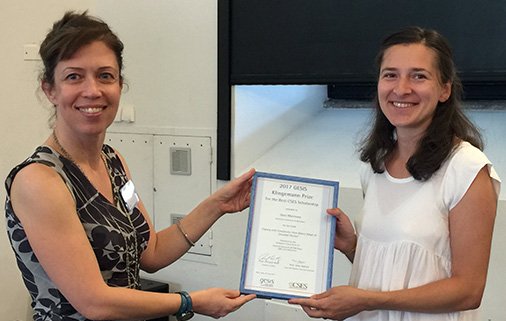Install this application on your home screen for quick and easy access when you’re on the go.
Just tap then “Add to Home Screen”
 Dani Marinova, Autonomous University of Barcelona, is the winner of the 2017 GESIS Klingemann Prize for the Best CSES Scholarship.
Dani Marinova, Autonomous University of Barcelona, is the winner of the 2017 GESIS Klingemann Prize for the Best CSES Scholarship.
The prize was awarded for her monograph Coping with Complexity: How Voters Adapt to Unstable Parties, published last year by ECPR Press.
There was a reception to honour Dani and her work on June 23 in Milan, at the 7th Annual General Conference of the European Political Science Association (EPSA). Pictured is Dani (right) receiving her award from Professor Orit Kedar of the Hebrew University of Jerusalem.
'Instability of political parties and party systems has become a notable feature of many contemporary democracies. Today political parties emerge, fuse, split, and die off not only in newer democracies, but also in established ones.
 Marinova's Coping with Complexity is a timely contribution on a highly salient phenomenon: the emergence of new party organisations and reshuffling of pre-existing ones. It offers a systematic account of party instability and its consequences for citizen electoral behaviour.
Marinova's Coping with Complexity is a timely contribution on a highly salient phenomenon: the emergence of new party organisations and reshuffling of pre-existing ones. It offers a systematic account of party instability and its consequences for citizen electoral behaviour.
Drawing on insights from a wide range of studies in political psychology and party organisations, Marinova argues that party instability makes it more difficult for voters to acquire information relevant to elections. It also alters voters' decision-making strategies in response to increased complexity of their electoral environment.
Drawing extensively on CSES Modules 1-3 and fusing it with original data on party and party system instability from established and newer democracies 1987–2011, Marinova finds that party instability leads to a low-information environment where citizens are more likely to engage in directional-intensity rather than proximity voting, and are more likely to rely on candidate characteristics when casting their votes. Moreover, she shows that citizens are less likely to employ retrospective economic evaluations in their vote choice if parties undergo significant organisational changes.
 This is a theoretically innovative and empirically rigorous study that challenges and refines principal theories of political behaviour, including economic voting, proximity voting and the use of informational heuristics.
This is a theoretically innovative and empirically rigorous study that challenges and refines principal theories of political behaviour, including economic voting, proximity voting and the use of informational heuristics.
Moreover, it provides a richer insight into the relationship between voters and political parties, as well as opens avenues for future comparative research.
Coping with Complexity therefore constitutes an important contribution to knowledge in the field of political behaviour that is based on, in all respects, a commendable and impressive use of the CSES.'
 In Dani's words...
In Dani's words...Nearly five decades ago, Carl Friedrich remarked: 'Party development is more highly dynamic than any other sphere of political life; there is no final rest, no ultimate pattern… Rather, there is constant change in one direction or another' (1968, p. 452). With new parties emerging across the continent and existing ones reshuffling, Friedrich’s remarks are as true today as ever. In Coping with Complexity I investigate how party changes — when parties emerge, fuse, split and die off — shape voter decision-making at the ballot box.
The gist of my argument is that parties are central to structuring and communicating electoral information. They organise messy information about ideology, policy goals and governing competences into a coherent set of electoral alternatives. Thanks to the informational cues that parties offer, voters are able to access information at a low cognitive cost. When parties undergo abrupt organisational changes, however, they profoundly alter the supply of electoral information. The electoral alternatives on the ballot are no longer fixed but need to be actively sought out. Voters need to do more of the work in acquiring, attributing and processing electoral information.
How do voters decide in such elections? I show that the process is twofold. First, instability in parties raises the cost of acquiring information. As a result voters tend to be less knowledgeable about the policy stances of competing parties. I characterise this first effect as passive on the part of voters – given the lower quality of information and poorer communication, voters are left uninformed about the parties they vote for. I characterise the second effect of party instability as voters’ active response to having limited information. Namely, voters actively seek coping mechanisms within contexts of frequent party instability. I consider a number of decision-making strategies that have been lauded for requiring little effort and information on the part of voters.
Using original data on party changes and survey data from roughly fifty European elections included in the Comparative Studies of Electoral Systems (CSES) Modules 1-3, I show that voters rely on a unique set of decision-making heuristics to cope with the information shortfalls triggered by party instability. Due to lower levels of familiarity with transformed parties’ policy stances, voters rely on diffuse and less cognitively taxing perceptions of party positions (namely, the direction and intensity of policy stances) to choose between competing actors. Furthermore, voters are considerably more likely to be swayed by their gut feelings toward party leaders when voting for new and splinter parties, suggesting an elevated effect of leader charisma in the absence of clear policy positions. What is more, when parties undergo changes between elections, voters use instability as a cue in and of itself, thus minimizing risk by shunning lesser known initiatives on the ballot.
I consider further economic retrospective voting. Given that economic voting is generally held to be less informationally and cognitively demanding (Key 1966; Fiorina 1981), are voters more likely to simplify their voting calculus by relying on retrospective economic considerations? The empirical results answer in the negative. I argue that party instability comes head-to-head with the logic of economic voting. Voters weigh economic retrospections against organisational changes in incumbents in order to predict future governing capacity. Party instability interrupts the continuity of organisations and adds considerable uncertainty about the extent to which past performance is a good predictor of parties’ future governing capacity. As a result, it is less rational on the part of voters to rely on strict economic retrospections when casting a ballot for the incumbent.
My interpretation of the empirical findings generally affirms voters’ capacity to make reasoned decisions in complex electoral spaces. Voters pursue the rational strategy of relying on information that is accessible and do so efficiently by minimising cognitive effort. Take the direction-intensity of party positions as an example. As the exact policy positions of newly formed parties are difficult to determine, voters who seek to make efficient use of their resources may well respond to extreme – yet clear – policy cues. Extreme policy positions in complex elections serve as useful cues to voters and thus have an important informational function in and of themselves. I thus conceive of voters’ reliance on direction-intensity rather than proximity rules as rational and efficient use of scarce information on party ideology.
I argue further that these decision-making mechanisms generally lead to good electoral outcomes. For one, the results suggest that voters are able to identify risk correctly. They are generally disinclined to hand over policy-making to newcomers who have no past record of governance and little credibility when it comes to policy. The findings on economic voting further confirm voters’ capacity to screen through important information and apply economic considerations to their vote choice when such considerations are credible. Overall the results speak well of voters’ decision-making capacities and ultimately constitutes good news for political representation.
Aida Just Bilkent University (Chair)
Stephen Quinlan GESIS-Leibniz Institute for the Social Sciences
Carlos Shenga Centre for Research on Governance and Development, Mozambique